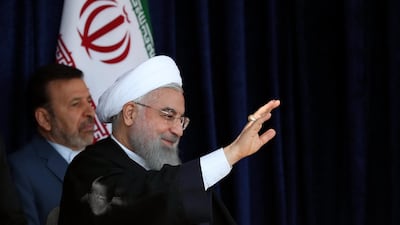After meeting Donald Trump, French President Emmanuel Macron concluded that the US president was committed to pulling out of the Iran nuclear deal. A few days later, new US Secretary of State Mike Pompeo said he felt that was the direction in which Mr Trump was leaning. Mr Trump himself has openly expressed his contempt for the deal and hinted that he would be pulling out.
Let's take him at his word on this. Admittedly, for a man the Washington Post has calculated has lied more than 3,000 times since taking office, that is a risky proposition. But Mr Trump wants out; he is now surrounded by Iran hawks like Mr Pompeo and new US National Security Adviser John Bolton and so it is certainly more likely than not that by Saturday, the US with unilaterally withdraw from the accord that was seen by the Obama administration as one of its crowning achievements.
So: the US pulls out, Mr Trump reiterates it was a terrible deal, enumerates all of its real flaws, probably exaggerates a number of others and throws in a few distortions about the Iranian nuclear programme (perhaps borrowed from Israeli Prime Minister Benjamin Netanyahu's silly dog-and-pony show last week). Then what?
Based on what Mr Trump has said, he feels that by pulling out of the deal he will then be able to pressure the Iranians into a new and better deal. Of course, the Iranians have said they won’t renegotiate. And candidly, why should they?
Vladimir Yermakov, director general for the department for non-proliferation and arms control at Russia’s Foreign Ministry said earlier this week that if the US pulled out, it would be an opportunity for Russia and Iran to grow closer. He suggested it would be easier for the Russians and the Iranians to actually do more deals – thus benefiting Iran in ways that might offset US sanctions. The Chinese would likely follow suit and use the opportunity to strengthen ties with Tehran. The Europeans have already indicated that they would intend to stay in the deal.
If this happened, one possibility is that the only country really hurt by the US's action is the US. Washington's credibility would be damaged, making a deal with North Korea on nuclear weapons less likely – or at least making the terms less favourable to the US in order to coax the North Koreans into a deal with a proven unreliable actor such as a post-Iran deal US. The US would have less influence over outcomes in Iran, would have played into Iranian hardliners' narratives about how untrustworthy it is and would face increasing tensions with allies.
Should the US move to impose central bank sanctions or the “nuclear option” of re-imposing full sanctions on the Iranians immediately, there are a couple of likely outcomes. While other countries might seek to simply continue doing business with Iran because the global financial system is so interconnected, European and other companies seeking to do business with Iran would likely very quickly run afoul of US sanctions and might stop doing business with Iran.
While this would nominally be the US's intent, it will create deep tensions between the US and Europeans and push the Iranians closer to the Russians and the Chinese.
Alternatively, European officials have in recent weeks discussed creating programmes of credits and assistance to affected European companies that would enable them to stay in their deals with Iran without feeling too much pain from the US.
The likelihood that the Iranians would be forced to negotiate by the announcement of a 180-day “clock” being triggered by, say, the central bank sanctions is very low. In fact, Iran’s Foreign Minister Mohammad Javad Zarif has said that in the event the US pulls out of the deal, it is very likely Iran will too. While this decision will ultimately be based on the degree to which the other signatories can preserve Iran’s benefits under the nuclear deal, should it happen, tensions will escalate in the region almost immediately. Israel seems to be encouraging such an outcome and the US stance, as illustrated by the recent deployment of Green Berets to the Saudi border with Yemen and its tacit support for Israeli strikes against Iranians in Syria, also seems likely to turn more aggressive.
In short, a new, improved deal seems an unlikely result of a US pull-out. Rising tensions are almost certain – and, as we have seen, the rising oil prices that will go with them. The potential for conflict will rise either directly between the US and Iran or between US proxies and Iran. America's influence with its allies and rivals will decline. And in all likelihood, the North Korea deal Mr Trump desperately wants will be on less favourable terms as a result of a pull-out. As for the future of Iran's nuclear capabilities –well, that becomes a deep concern again, almost immediately.
In short, it is hard to see how the US action is in the US's interests, the interests of peace or of its allies. But it also seems likely to happen. So now is a time to prepare for a new and dangerous period of turbulence in Iran’s relations with the US, its allies and the world.
David Rothkopf is CEO of The Rothkopf Group, senior fellow at the Johns Hopkins School of Advanced International Studies, a visiting scholar at the Carnegie Endowment for International Peace and most recently author of The Great Questions of Tomorrow

